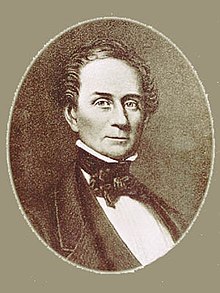Henry Johnson
Henry Johnson (born September 14, 1783 in Virginia , † September 4, 1864 in Pointe Coupee Parish , Louisiana ) was an American politician and governor of the state of Louisiana from 1824 to 1828 . He also represented his state in both chambers of Congress .
Early years and political advancement
After elementary school, Johnson studied law. In 1809 he moved to the Orleans Territory , where he was initially employed in the administration of the Second Superior Court . From 1811 he was a district judge. In 1812 he was a member of the Louisiana Constituent Assembly. That year he applied unsuccessfully for a seat in the US House of Representatives . He then worked as a lawyer in Donaldsonville .
First term in the US Senate
After the death of US Senator William Charles Cole Claiborne in 1817, Johnson, then a member of the Democratic Republican Party , was appointed as its successor as Class 2 Senator . In 1823 he was confirmed in this office, from which he resigned on May 27, 1824, because he wanted to apply for the office of governor of Louisiana, contrary to his promise made in 1823. During his tenure in the Senate, he was Chairman of the Committee on Indian Affairs . He made himself popular with the Creole population of Louisiana because he defended their land rights in the Senate and advocated the clearance of state land for Creole settlers.
Louisiana Governor
On July 5, 1824, Johnson was elected the new governor of his state. He began his four-year term on December 13 of the same year. During his tenure, the state's infrastructure was expanded. The expansion of the streets and canals is particularly worth mentioning. At that time, the Bank of Louisiana and a growers' association came into being. The economy and trade boomed tremendously during Johnson's tenure. In addition, the state legislation has been revised. At that time, the future capital of the state was also controversial. The Anglo-Americans advocated relocating the capital from New Orleans , while the Creoles would have liked to leave the capital there or at least want it to be in a French-influenced area. As a compromise, the capital was temporarily relocated to Donaldsonville. In 1849 Baton Rouge became the capital. There was also great tension between the Anglo-Americans and the Creole population of Louisiana during Johnson's tenure as governor.
Congressman and second term Senator
In 1829 Johnson ran unsuccessfully for return to the US Senate. In the early 1830s he became a member of the Whig Party . In 1834 he was elected to the US House of Representatives in Washington as the successor to the resigned Edward White . After two re-elections he remained between September 25, 1834 and March 3, 1839 in this body.
In 1838 and 1842, Henry Johnson applied unsuccessfully for a return to the office of governor of Louisiana. After the death of US Senator Alexander Porter , who had not even started his mandate due to illness, Johnson was appointed as Class 3 Senator as his successor. His second term in the Senate began on February 12, 1844 and ended on March 3, 1849. During this time he was chairman of the Committee on Pensions . He stood up for the annexation of Texas and called for the repeal of the import tariff law of 1846. In the next congressional elections, he was defeated by the Democrat Pierre Soulé .
Another résumé
In 1850 he applied unsuccessfully to return to Congress. Then he withdrew from politics. He then worked as a lawyer at Pointe Coupee Parish. He lived to see the outbreak of the Civil War and died on September 4, 1864. Henry Johnson was married to Elizabeth Key.
Web links
- Henry Johnson in the National Governors Association (English)
- The Governors of Louisiana (English)
- Henry Johnson in the Biographical Directory of the United States Congress (English)
- Henry Johnson in the database of Find a Grave (English)
| personal data | |
|---|---|
| SURNAME | Johnson, Henry |
| BRIEF DESCRIPTION | American politician |
| DATE OF BIRTH | September 14, 1783 |
| PLACE OF BIRTH | Virginia |
| DATE OF DEATH | 4th September 1864 |
| Place of death | Pointe Coupee Parish , Louisiana |



